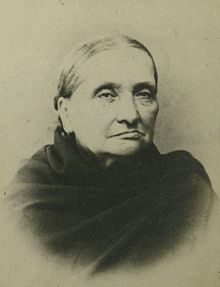| Carmen de Santistevan y Avilés | |
|---|---|
 | |
| First Lady of Ecuador | |
| In office October 16, 1856 – August 31, 1859 | |
| Preceded by | Teresa Jado |
| Succeeded by | Rosa Ascázubi y Matheu [es] |
| Personal details | |
| Born | (1810-05-03)May 3, 1810 Daule, Spanish Empire |
| Died | March 30, 1904(1904-03-30) (aged 93) Guayaquil, Ecuador |
| Resting place | General Cemetery of Guayaquil [es] |
| Spouse | Francisco Robles |
Carmen de Santistevan y Avilés (May 3, 1810 – March 30, 1904) was the First Lady of Ecuador from 1856 to 1859 as the wife of President Francisco Robles.
Early life
Carmen de Santistevan y Avilés was born on May 3, 1810, in Daule, then part of the Spanish Empire. She was the daughter of Gabriel de Santistevan y Olvera and his first wife, Francisca de Avilés y Castro, with whom he had another daughter named Francisca. After her father became a widower, he traveled to Buenos Aires, remarried, and had nine children, never returning to Ecuador.
She was a descendant of the paternal line of the Komnenos, an important dynasty of the Byzantine Empire.
Marriage and offspring
Carmen de Santistevan y Avilés met and became engaged to General Francisco Robles while living with her sister Francisca, who was married to Robles's brother, Ciríaco Robles García. Their wedding took place on November 5, 1835, in Guayaquil Cathedral.
The marriage produced three children, the first of whom did not reach adulthood:
- Francisco Robles y Santistevan (1838–1841)
- Ignacio Robles y Santistevan (1839–1915), married to Rafaela de Buenaventura y Macías, with offspring
- Dolores Robles y Santistevan (1841–1904), married to José Serafín Baquerizo Vera, with offspring
Her son Ignacio became a corvette captain, the civil and military chief of the Plaza de Guayaquil (1895), Eloy Alfaro's Minister of Foreign Affairs (1895–1896), the governor of Guayas (1896–1898), and the consul of Mexico in Guayaquil (1896–1902), among other posts. The wedding of her daughter Dolores took place on September 26, 1856, in the halls of Carondelet Palace.
Later years
A practicing Catholic, she joined others (such as First Lady Teresa Jado) in defending the cause of the Jesuits who unexpectedly arrived in Guayaquil when they were expelled from the Republic of New Granada in 1851.
Carmen de Santistevan y Avilés died in Guayaquil on March 30, 1904, at the age of 93. She was buried in the General Cemetery [es], where the family owned a mausoleum richly decorated with sculptures.
References
- ^ Boletín, Volume 9; Volume 11 (in Spanish). Centro de Investigaciones Históricas de Guayaquil. 1952. p. 177. Retrieved February 7, 2019 – via Google Books.
- ^ Pérez Pimentel, Rodolfo. "Francisco Robles Garcia". Diccionario Biográfico del Ecuador, tomo XII (in Spanish). Universidad Católica de Santiago de Guayaquil. Archived from the original on March 4, 2016. Retrieved February 7, 2019.
- Núñez del Arco, Francisco (April 13, 2011). "La descendencia ecuatoriana de los emperadores bizantinos" [The Ecuadorian Descent of the Byzantine Emperors]. Coterraneus (in Spanish). Retrieved February 7, 2019.
- Revista Hidalguía número 19. Año 1956 (in Spanish). Ediciones Hidalguia. p. 741. Retrieved February 7, 2019 – via Google Books.
- Boletín del Centro de Investigaciones Históricas (in Spanish). Centro de Investigaciones Históricas de Guayaquil. 1931. p. 44. Retrieved February 7, 2019 – via Google Books.
- Collection of Biographies of Ecuadorians Issued in Pamphlet Form, Volume 1 (in Spanish). 1864. p. 35. Retrieved February 7, 2019 – via Google Books.
- Establecimiento de la Compañía de Jesús en la República del Ecuador en el año de 1851 [Establishment of the Society of Jesus in the Republic of Ecuador in the Year 1851] (in Spanish). I. Miranda. 1851. pp. 45–47. Retrieved February 7, 2019 – via Internet Archive.
- "Rutas patrimoniales del Cementerio General de Guayaquil" [Heritage Routes of the General Cemetery of Guayaquil] (PDF) (in Spanish). National Institute of Cultural Heritage of Ecuador. Retrieved February 7, 2019.
| Preceded byTeresa Jado | First Lady of Ecuador 1856–1859 |
Succeeded byRosa Ascázubi y Matheu [es] |